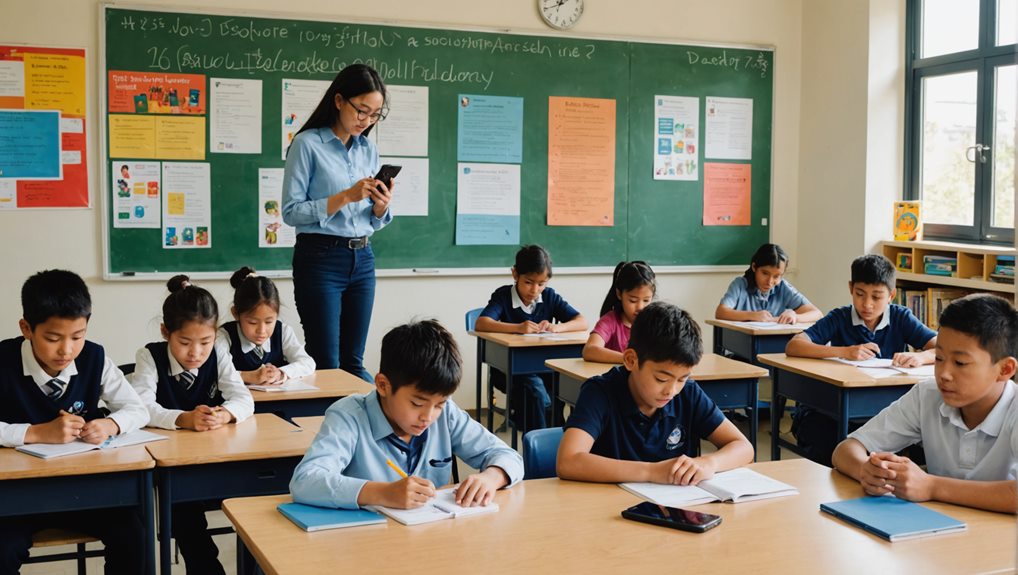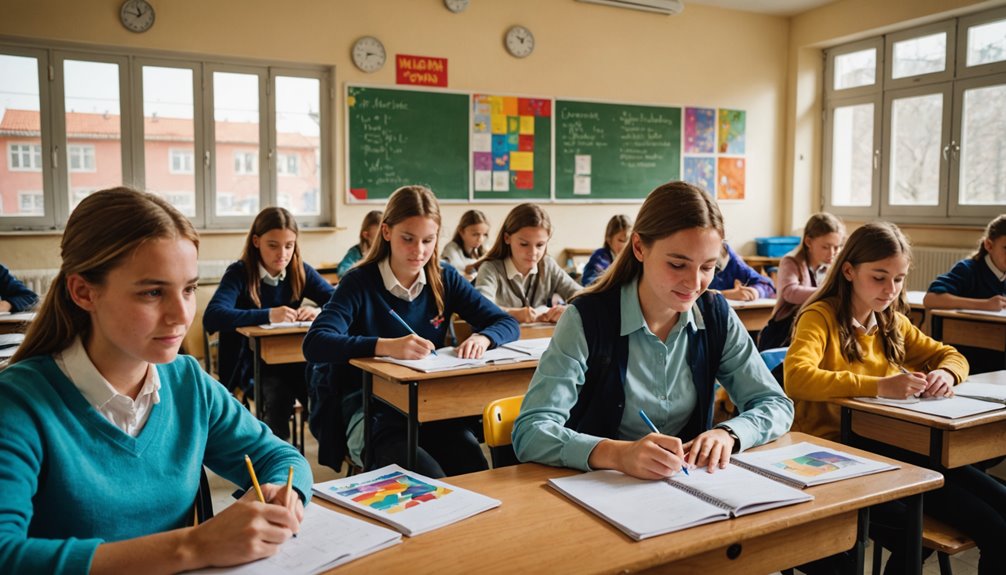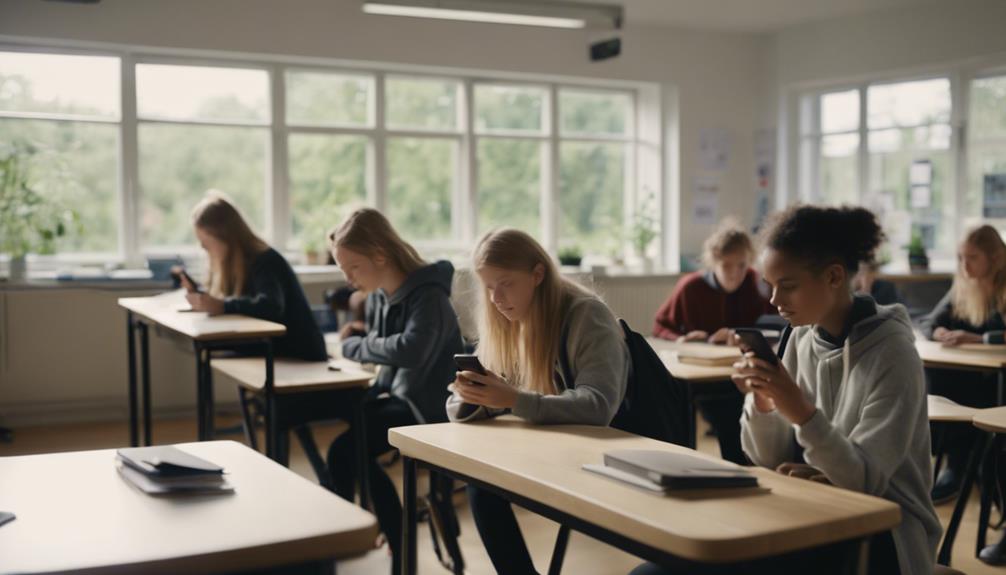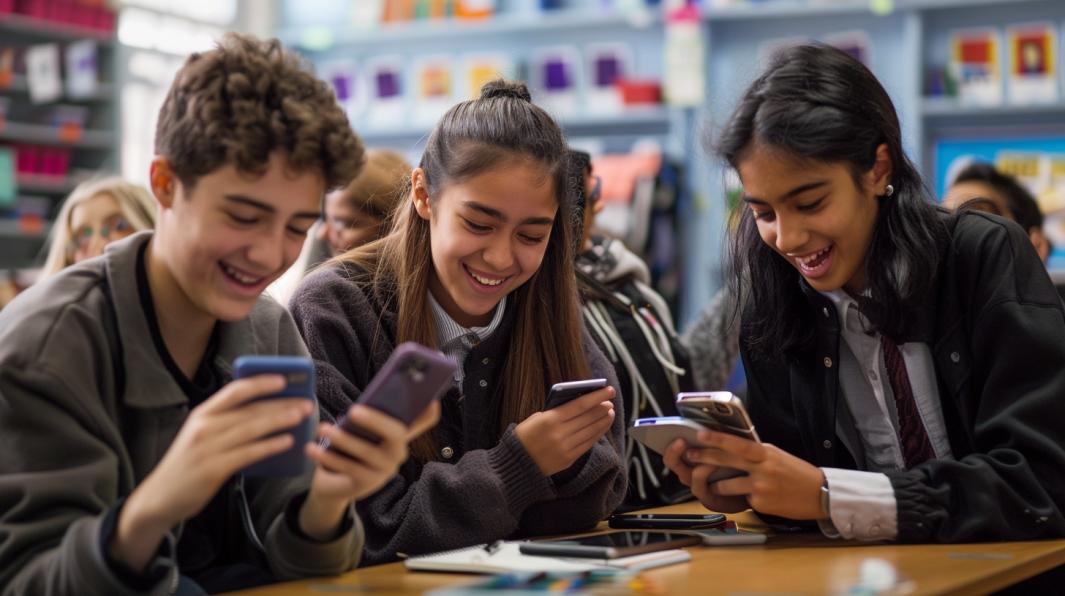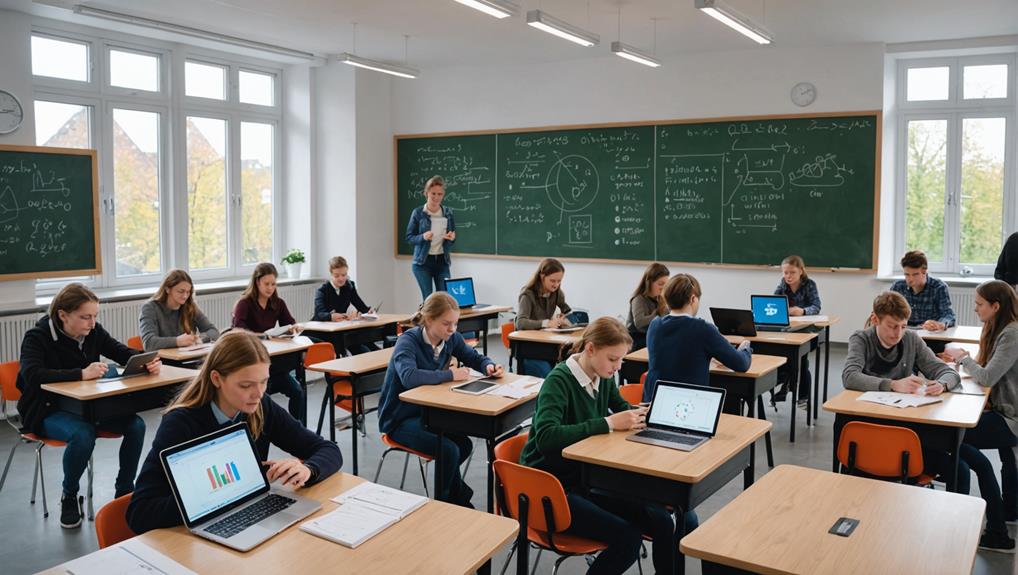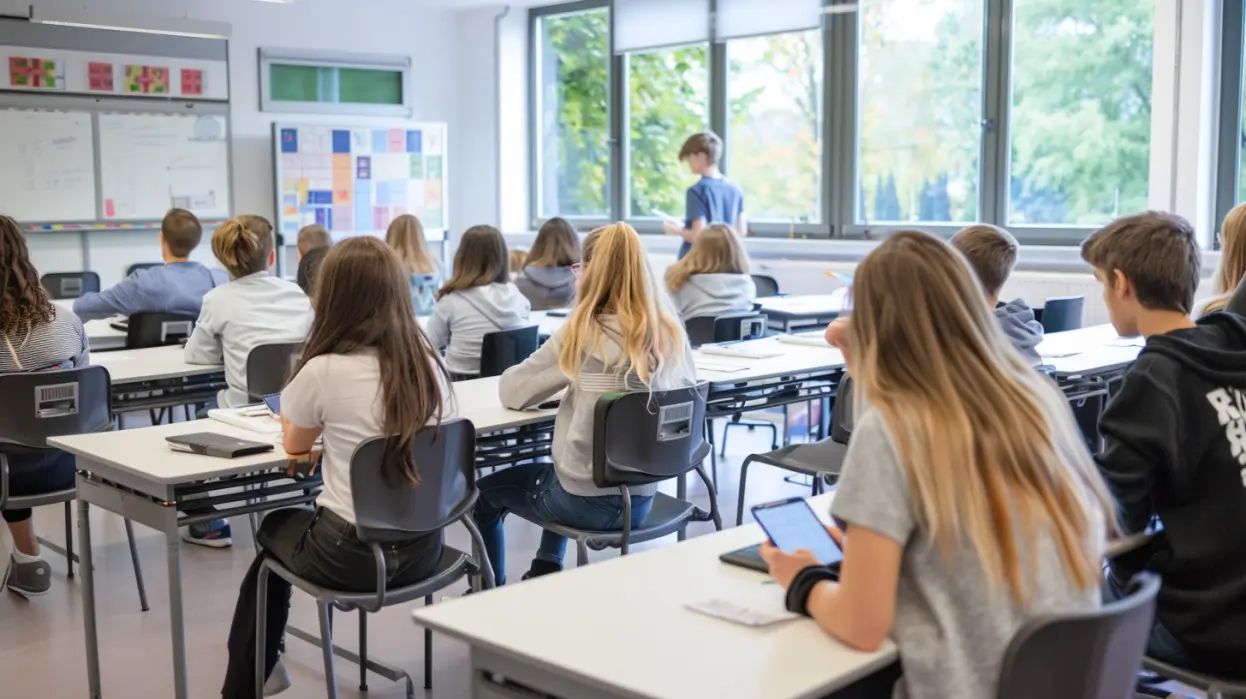Mobile Phone Policies in Polish Schools
Mobile phone policies in Polish schools differ significantly between primary and secondary institutions. Primary schools generally enforce strict bans on mobile phone use to minimize distractions and enhance focus. In contrast, secondary schools adopt a more lenient stance, allowing regulated usage during specific times. These policies are influenced by parental involvement and the recognition of students’ growing independence. Evidence indicates that restrictions can lead to improved academic engagement and emotional well-being among students. The varied perspectives on enforcement highlight the challenge of balancing discipline with autonomy, setting the stage for further insights into the complexities of these educational environments.
Key Takeaways
- Polish primary schools often prohibit mobile phones during school hours to minimize distractions and enhance focus on learning.
- Secondary schools allow more lenient phone usage, balancing student autonomy with responsible use and enforcement challenges.
- Parental involvement is crucial in supporting mobile phone policies and ensuring children’s safe online experiences.
- Schools like Embassy International School implement structured policies to promote discipline and reduce disruptions from mobile phone use.
- A growing trend in Europe, including Poland, is towards mobile phone bans in schools to improve student engagement and academic focus.
Mobile Usage Among Polish Students
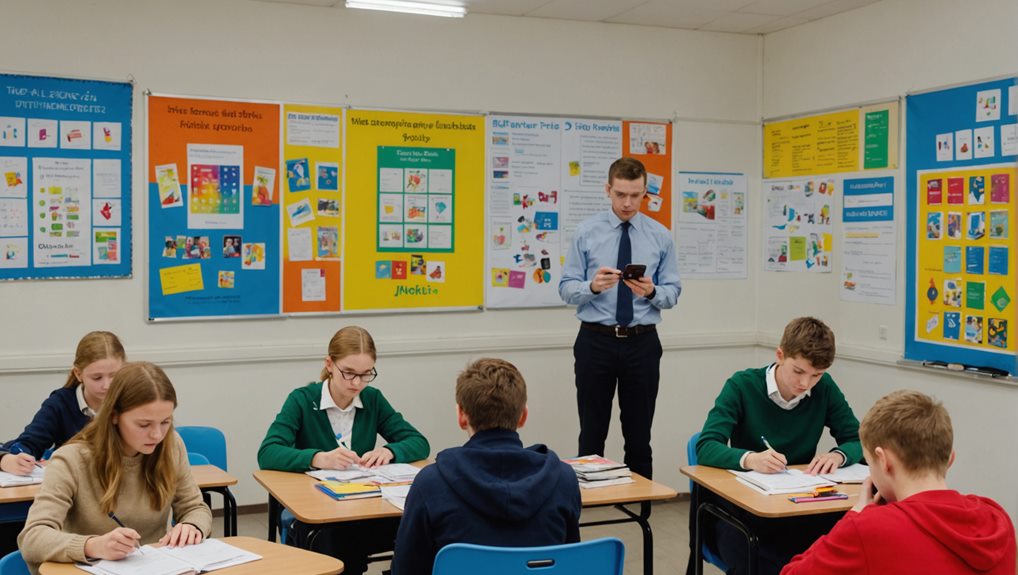
Mobile phone usage among Polish students has become a significant aspect of their daily lives, particularly in the context of internet access and social engagement. Approximately 84% of Polish children aged 9 to 17 connect to the mobile internet daily, with a notable trend among older students and girls utilizing these platforms for educational benefits and peer communication. This increasing reliance highlights the necessity for enhanced digital literacy, enabling students to navigate online environments effectively.
Despite the potential advantages, concerns regarding online safety persist. A small percentage of students encounter serious risks, such as receiving sexual messages or engaging in harmful communication. These statistics underscore the importance of parental involvement in establishing guidelines and monitoring internet use, fostering a safer online experience for children.
Moreover, while many students express confidence in their ability to manage their online presence, a significant number struggle with privacy settings and critical assessments of content. This gap in digital literacy necessitates a thorough approach to education that not only promotes safe internet practices but also equips students with the skills to engage responsibly in digital spaces.
As a result, fostering an environment of informed and secure mobile phone usage is essential for Polish students.
Primary vs. Secondary School Policies In Poland
In examining the policies governing mobile phone usage in Polish schools, it is evident that a distinct divergence exists between primary and secondary educational institutions. Primary schools typically enforce stricter regulations, often prohibiting mobile phones entirely during the school day. This approach reflects a desire to minimize distractions and enhance the educational impact of lessons, fostering an environment conducive to learning. Parental involvement is often essential in supporting these policies, as parents generally favor restrictions that promote student focus and responsibility.
Conversely, secondary schools exhibit more leniency, permitting phone usage during designated times or in specific areas. This shift acknowledges the growing independence of older students and the necessity of teaching responsible phone usage. However, such policies present enforcement challenges, as teachers must balance the need for student autonomy with maintaining discipline in the classroom.
Teacher perspectives vary, with some advocating for stricter controls to prevent misuse, while others emphasize the importance of preparing students for responsible mobile phone management in real-world contexts. Ultimately, the differences in policies reflect broader educational philosophies regarding student responsibility and engagement in the learning process.
Case Studies of Mobile Phone Policies in Polish Schools
This section will examine specific case studies of mobile phone policies at Embassy International School in Kraków, highlighting its approach and effectiveness in managing mobile device usage. Analysis of this case reveals strategies and outcomes, providing insights into how different educational environments address this issue.
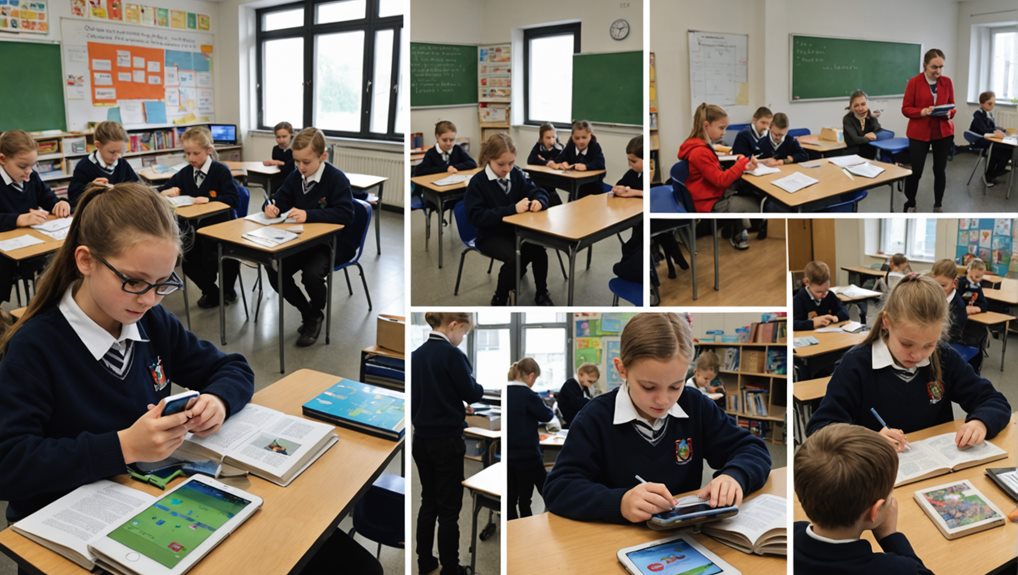
Embassy International School,Kraków
The mobile phone policy at Embassy International School in Kraków exemplifies a structured approach to managing the challenges posed by technology in educational settings. By prohibiting mobile phones for younger students and regulating their use for older pupils, the school aims to minimize classroom disruptions and enhance student engagement.
- Fostering a focused learning environment
- Encouraging responsible technology integration
- Enhancing academic performance through reduced distractions
- Strengthening parental involvement in child development
In Early Years and Primary School, mobile phones are completely banned, reinforcing the priority of uninterrupted learning. For students in Years 7 to 11, phones must be turned off and stored during school hours, ensuring that distractions are minimized. This policy promotes a culture of discipline and responsibility, as students learn to manage their devices appropriately.
For Years 12 and 13, the allowance of mobile phones underscores a balanced approach, recognizing the potential educational benefits when used sensibly. The policy also facilitates communication through the school office, ensuring that essential contact with families is maintained without compromising the learning environment.
To conclude, Embassy International School’s policy effectively addresses the complexities of modern technology in education while promoting positive outcomes for students.
Perspectives from Students, Teachers, and Parents
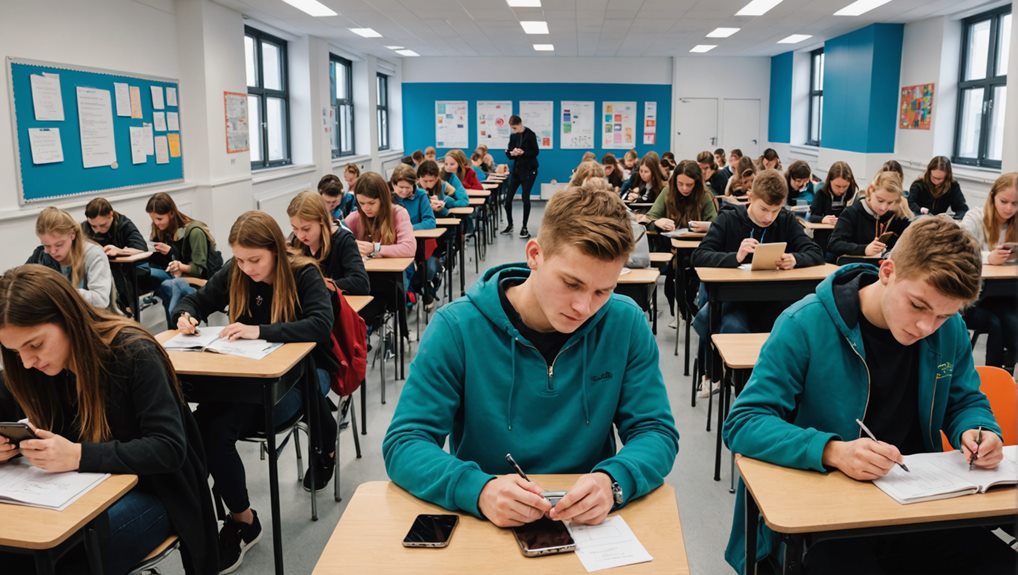
In recent discussions surrounding mobile phone policies in Polish schools, various stakeholders—students, teachers, and parents—offer a range of perspectives that illuminate the complexities of the situation.
- Increased face-to-face social interactions among students.
- Concerns about academic focus and dependency on technology.
- The emotional toll of adapting to a phone-free environment.
- The potential for improved mental health due to reduced cyberbullying.
Parental concerns primarily revolve around their children’s academic performance and social development. Many parents support the phone ban, citing the need for focused learning environments.
Teacher perspectives tend to align with this, as they note improvements in classroom engagement and a decrease in distractions. However, some educators caution against a total ban due to the potential negative impacts on student focus and challenges in adapting to the absence of mobile devices.
Students face significant challenges adjusting to the new policy, with mixed feelings about its effectiveness. While some appreciate the increased social interactions, others struggle with detachment from their phones. Overall, the debate highlights the necessity of balancing policy effectiveness with the realities of student life in a technology-driven world.
Comparing Mobile Phone Policies in Europe
Numerous European countries have adopted varying approaches to mobile phone policies in schools, reflecting diverse educational priorities and cultural values. Countries like Italy, Spain, and Albania have instituted bans, aiming to mitigate digital distractions and enhance student engagement. These bans are often supported by educators who argue that smartphones detract from learning and can exacerbate tensions between students and teachers.
In contrast, nations such as Poland, Germany, and Denmark allow individual schools to determine their policies, leading to a patchwork of enforcement that can depend heavily on parental involvement and community needs.
The impact on learning is a significant consideration; while some argue that smartphone bans promote concentration, others advocate for a balanced approach that integrates technology responsibly. Countries considering bans, such as Belgium and Finland, reflect a growing concern over safety and the necessity of addressing online bullying within educational environments.
Ultimately, effective policy enforcement is essential, regardless of the chosen approach, as it ensures that the intended benefits of these policies—enhanced focus and reduced distractions—are realized within the classroom setting.
Frequently Asked Questions
The legal implications of mobile phone policies in schools encompass parental consent, privacy rights, and discipline measures, while balancing educational benefits and cyberbullying prevention, necessitating a nuanced approach to uphold both student rights and institutional responsibilities.
Mobile phone policies greatly influence academic performance by enhancing parental involvement, improving student engagement, reducing classroom distractions, fostering positive social interactions, and ultimately contributing to better learning outcomes in educational environments.
In critical situations, like a stormy sea, exceptions for phone use are crucial. Safety protocols emphasize parental communication and updates, allowing teacher discretion to foster student responsibility within established guidelines, ensuring effective emergency responses.
Schools are exploring tech alternatives like tablets and interactive whiteboards to mitigate classroom distractions. These tools enhance learning benefits and promote parental involvement, necessitating effective policy enforcement to maximize educational outcomes and minimize disruptions.
As educational landscapes shift, mobile phone policies adapt to embrace parental involvement and foster student discipline. Enhanced teacher training and a focus on school culture promote digital literacy, ensuring policies evolve responsive to emerging technological realities.
Conclusion
To sum up, mobile phone policies in Polish schools mirror a growing concern regarding student distraction and academic performance. Many educators believe that mobile phones can hinder focus, highlighting the need for balanced policies that promote responsible mobile usage while supporting the learning environment. As schools navigate differing viewpoints from stakeholders, the implementation of effective mobile phone regulations remains essential for promoting ideal learning conditions.


